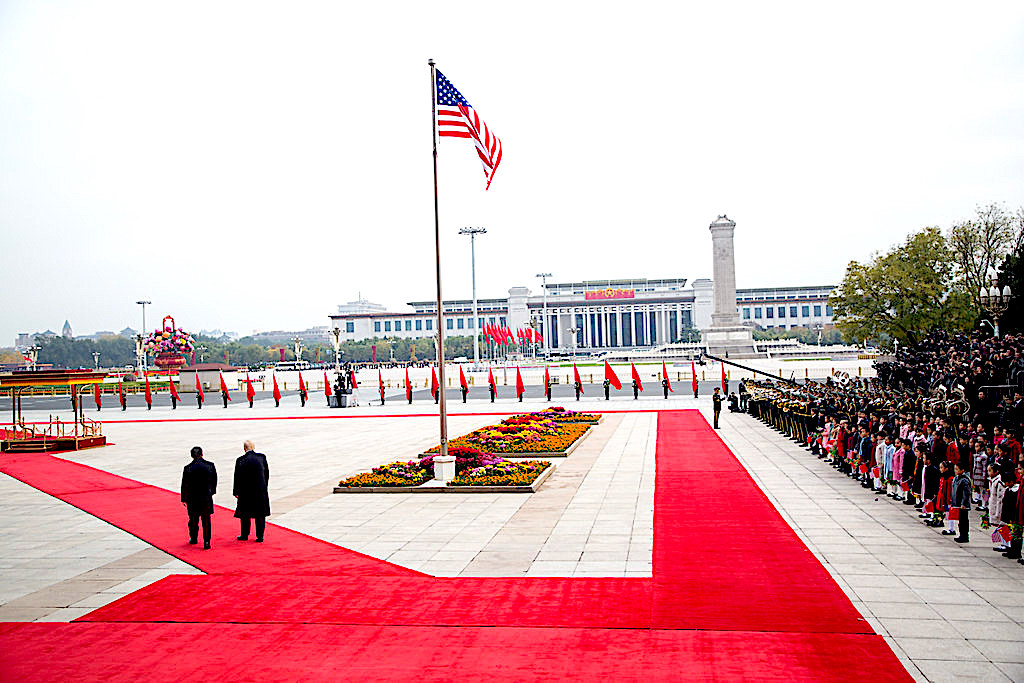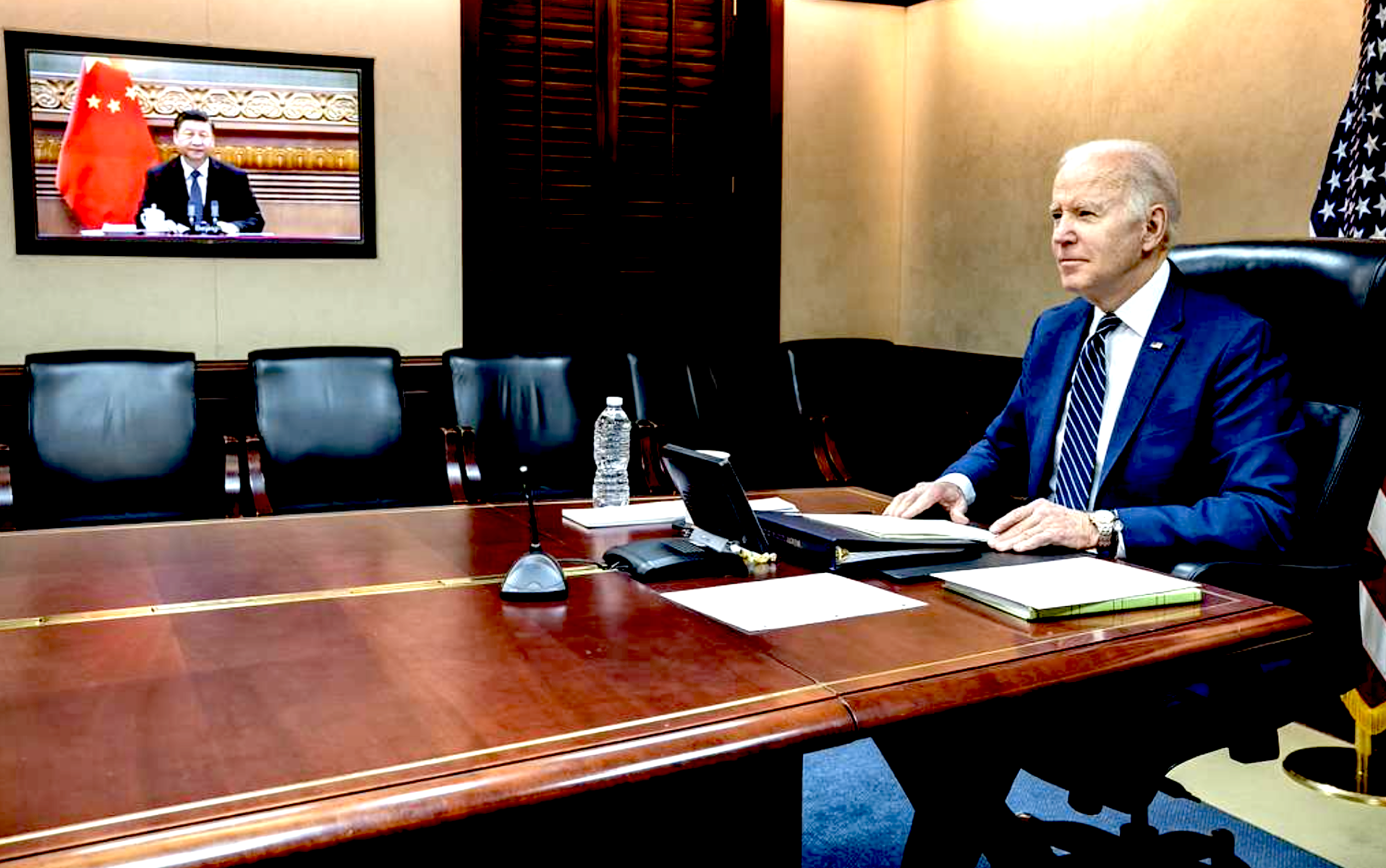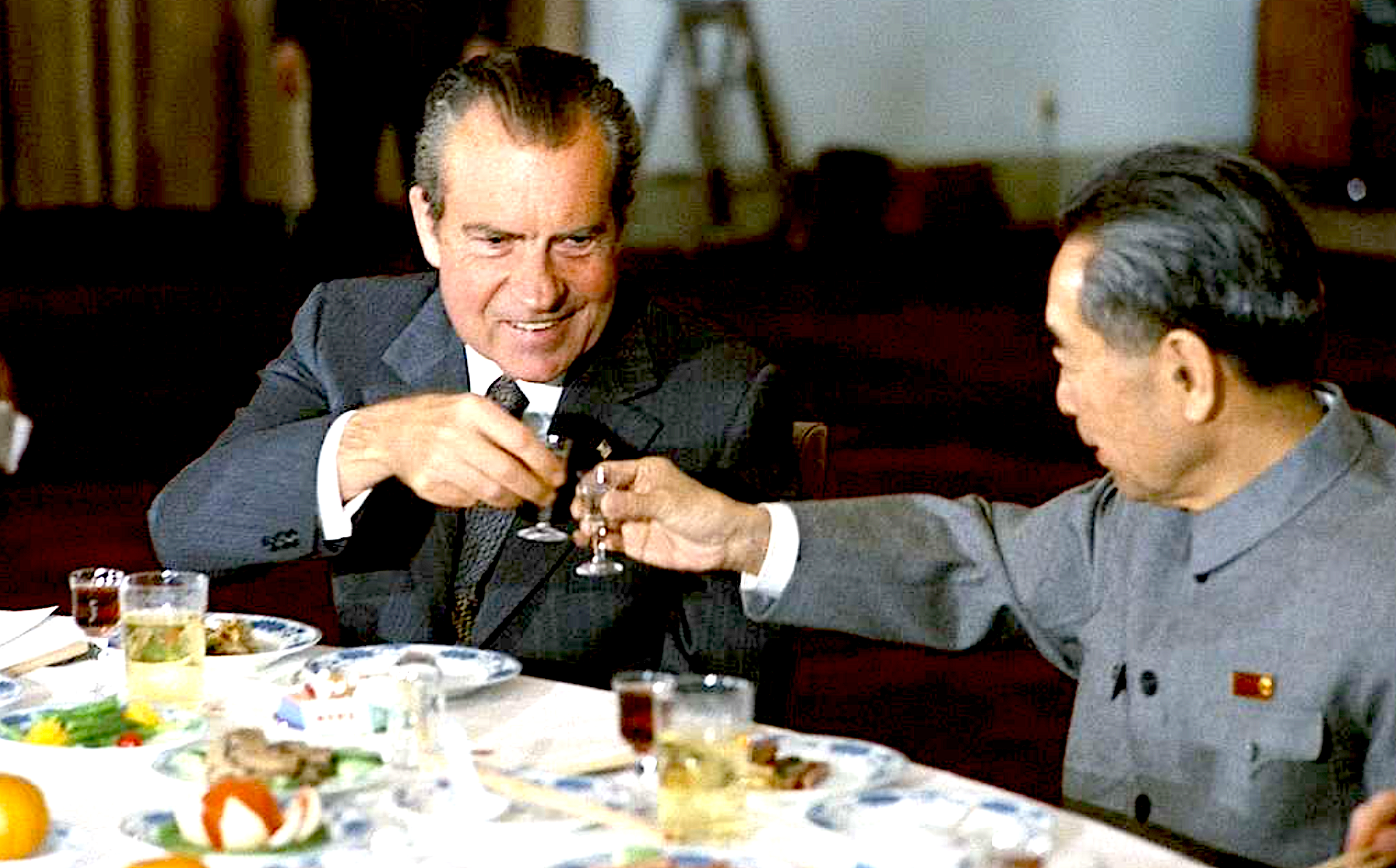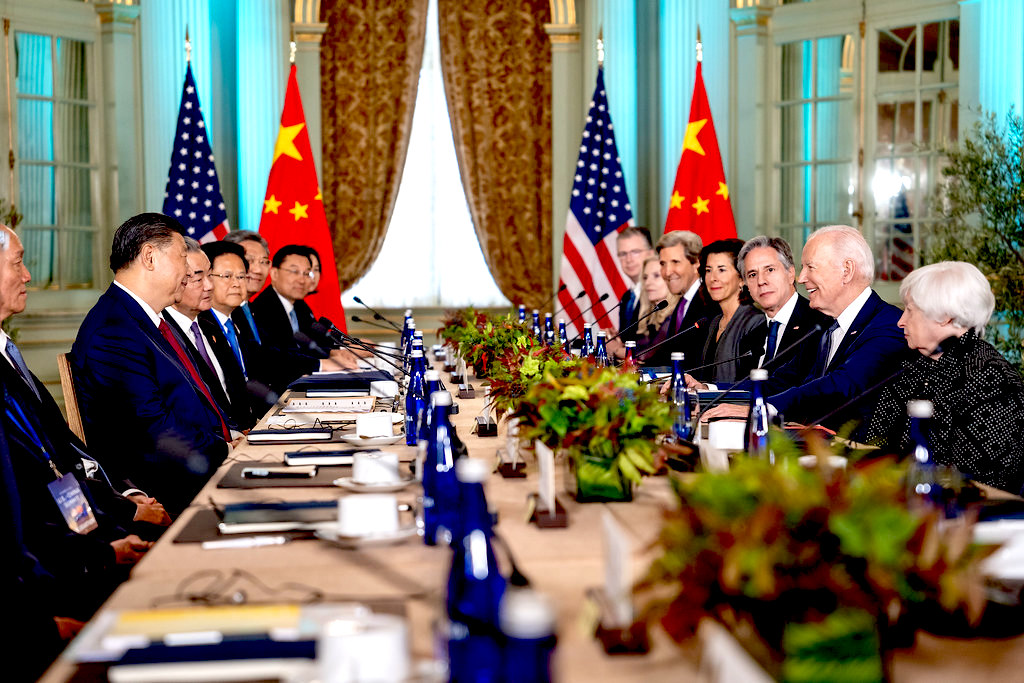This is the opening move in a protectionist regime the U.S. president will extend significantly to prove his bona fides as a Sinophobe.

Wal-Mart in Charlotte, North Carolina, 2012. (Mike Kalasnik, Wikimedia Commons, CC BY-SA 2.0)
By Patrick Lawrence
ScheerPost

I love the photograph The New York Times ran atop Jim Tankersley’s May 18 story analyzing the inadvisable raft of tariffs on Chinese imports President Biden authorized four days earlier.
There is the old coot signing the paperwork at a desk in the Rose Garden as a crowd of seven looks on admiringly. Polo shirts, sneakers, a baseball cap. Six of these seven are people of color; four are women.
Perfect, just perfect. Study the picture. These dutiful onlookers are not officeholders or administration officials. They are union leaders from what were once powerful labor organizations: steelworkers, autoworkers, machinists, communications workers, the AFL–CIO.
These seven represent, in short, the very people who will get hit hardest as the executive order Biden just sent to Katherine Tai, his special trade representative, takes effect.
That’s Joe, isn’t it? The Man from Scranton has made his career gathering about him for the photo ops those toward whom he is indifferent and, often enough, those he is about to screw without a second thought (or even a first in Joe’s case).
Remember that famous occasion five years ago next month, when Biden finished addressing the Poor People’s Campaign in Washington about his plans to end poverty and then went to wealthy investors at the Carlyle Hotel in Manhattan to say that, if elected, “Nothing would fundamentally change”?
If he has by and large kept his word these past three years, something did change, something big, when, 10 days ago, he ordered a very wide range of import taxes on Chinese-made imports.
Will the U.S. make itself a manufacturing economy once again, bringing lost industrial production back from the dead? This is the stated aim of the new tariff regime, but no, what is done is done, in my view. Will America, in consequence of higher costs that are now inevitable, be a more expensive place to live for those to whom costs matter most? Yes, this will change, over time probably by a lot.
Biden’s trade and national security people, and you can’t tell one from the other these days, were preparing the ground for that Rose Garden moment for many months. They left intact tariffs of 10 percent, covering Chinese imports worth $300 billion, that Donald Trump imposed in September 2019.
But blocking exports in the other direction has been the Biden regime’s preoccupation. Under cover of “national security,” these include advanced semiconductors and other high-technology products in the White House’s attempt — it will never succeed — to subvert the Chinese economy in sectors wherein American companies cannot compete.
Don’t look now, but Joe Biden has just adopted the Trump China policy he has previously and relentlessly repudiated — and gone one further.

China’s President Xi Jinping and Trump in Beijing, 2017. (White House, Shealah Craighead)
The May 14 executive authorization is indeed a major escalation of the Trump administration policy. Steel and aluminum, critical minerals (including so-called rare earths), solar energy panels, semiconductors, syringes and other medical equipment, those immense ship-to-shore cranes you see at seaports: The list of Chinese-made goods on which Biden will impose import levies is long, and the numbers high.
Duties on semiconductors double, to 50 percent. So do levies on batteries and battery components, from 25 percent to 50 percent. Tariffs on electric vehicles, China having made itself a global leader in EVs, go from 25 percent to 102.5 percent. This last comes close to an outright ban on the sale of Chinese electric cars in the U.S.
Some perspective here: The total value of the imports now to be taxed is $18 billion. Last year U.S. merchandise imports from China were worth $427 billion (as against exports to China of $148 billion), according to Census Bureau figures.
But in my read, Biden’s executive order is the opening move in a protectionist regime that will be extended significantly — especially in the near future, as Biden competes with Donald Trump and the hawks on Capitol Hill to prove his bona fides as a Sinophobe.
In essence, Biden just changed the direction of America’s transpacific economic policy. Chinese retaliation is more or less certain, and then it will be bad to worse for who knows how long.

Biden in virtual talks with China’s Xi Jinping in March 2022. (White House, Public domain)
Jim Tankersley, in that Times analytic piece noted above, was right to call Biden’s just-announced tariffs a shift of historic magnitude.
“Mr. Biden’s decision on Tuesday to codify and escalate tariffs imposed by Mr. Trump,” he wrote, “made clear that the United States has closed out a decades-long era that embraced trade with China and prized the gains of lower-cost products over the loss of geographically concentrated manufacturing jobs.”
This passage needs a little decoding, and I will get to that in a second.
With all those union chiefs around him, Biden went long, very long, on how this sprawl of import taxes will be to the benefit of American workers. That is not what this radical turn in policy is about, and I wish those labor leaders understood this better than they appear to have done.
I wish they had thought better of standing behind a president whose mind is on things far distant from the welfare of their memberships. The Chinese will not pay these tariffs, as various economists point out. Those union leaders’ dues-paying constituents will.
What Biden just announced is primarily the strategy of a nation that has hollowed out its industrial base — willingly, of its own accord — as it tries to project geopolitical power against a nation that has done just the opposite.
Closely related to this is a now-declared effort to protect the backsides and profits of American corporations no longer capable of dominating the globalized economy they so eagerly insisted upon but a couple of decades ago.

Corporate America flag at an antiwar protest on Sept. 15, 2007, in Washington, D.C. (Ragesoss, Wikimedia Commons, CC BY-SA 3.0)
There are two other ways to look at this bold turn toward nationalistic protectionism.
One, the policy cliques in Washington and the corporations they serve are nearly frantic as the consequences of decades’ worth of careless economic policy, driven by greed and misapprehension, return to haunt them.
Keeping a competitor out by erecting walls made of import tariffs, when viewed from this perspective, is the desperate choice of people who simply cannot measure up to a moment that requires more intellect, imagination and courage than they can summon.
Two, the working and middle classes in America were sacrificed to those decades of corporate greed, as anyone paying attention at the time could discern without difficulty. They will be sacrificed a second time now, as Washington blunders on, this time in an effort to bring back what it decided 40 years ago it was all right to give away.
Since the Opening of China

U.S. President Richard Nixon and Chinese Premier Zhou Enlai toast, Feb. 25, 1972. (U.S. National Archives and Records Administration, Public domain)
The historic opening to China in the 1970s had engendered, by the 1990s, all sorts of unschooled expectations neither Kissinger nor Nixon would ever have entertained. They were realists. Those who managed China policy from, say, the Clinton years onward professed motivations worthy of Victorian missionaries.
They were at bottom Wilsonians. Investing in China, they argued ad nauseam, will turn the Chinese into liberal democrats in the Western mold. James Fallows, the longtime Atlantic writer, called this during his time in Asia the “just like us” line of reasoning.
It seems almost too naïve to believe anyone took this stuff seriously, and maybe it was all along simply political cover for the greedfest it was used to justify. By the mid–1990s, as the Clinton administration was concluding the North American Free Trade Agreement, American corporations were piling across the Pacific by the thousands to invest in manufacturing platforms from which they exported goods back to the U.S.
In 2001 China gained membership in the World Trade Organization. Its trade surpluses then grew precipitously, especially but not only with the U.S., but this was O.K.: Everybody was winning.
Please Donate to the
Spring Fund Drive!
Three other trends complete this brief pencil-sketch.
One, any thought that Western investment would transform the Chinese into a nation of Westernized liberals — so devoid of any grasp of the dynamics of different histories, cultures, traditions, political systems and identity altogether — was revealed as the daydream of American-centric know-nothings.
This dawning realization did not arrive well among the Sinophobes, notably the descendants of the “Who Lost China?” crowd on Capitol Hill.
Two, China proved an even more energetic climber up the development ladder than Japan or any of the so-called Asian Tigers.
The speed with which it made itself competitive in ever more advanced industries left American corporations and the untraveled policy planners in Washington, fair to say, flabbergasted. It had to: It has flabbergasted everyone.
Finally, in the decade after China joined the WTO, it became obvious, and in time a touchy political question, that the migration of so much U.S. manufacturing — south to Mexico via NAFTA, across the Pacific to China — had destroyed a great deal of the nation’s industrial base and countless of its communities while devastating the working and middle classes.
In more time it became obvious to the policy cliques in Washington that they no longer had an industrial base sufficient to their plans to salami-slice the U.S.–China relationship ever closer to open conflict.
David Autor, an MIT economist called these recognitions, in a 2016 study, “the China shock.” Happy talk gave way to bitter realities in that first decade after China, with strong U.S. backing, joined the WTO.
Autor and his two co-authors calculate that the wholesale migration of manufacturing to China had, by the time they wrote, destroyed a million manufacturing jobs and two and a half times that many when they counted jobs dependent on manufacturing.
It is a mystery why what American corporations and those in government serving them have done in the service of sheer profit lust came as a shock to anyone.
I wonder if a certain judgment has not been made. Precise figures are hard to come by, but in days gone by something more than a third of Chinese-made exports to the U.S. were the output of U.S. and other Western companies with mainland operations. Do the new Biden tariffs arrive because the party is over for the multinationals as China transforms itself into an advanced economy?
It is very strange to read about these events in corporate media, or listen to the government officials these media quote as authorities.
The worst of these tellings veer toward a version of the old “yellow peril.” The Chinese stole all these jobs! The Chinese, those untrustworthy inscrutables, tricked us into buying all these low-priced products!
It is not very flattering to mark down Americans as so helpless as this. But those who shape opinion in the U.S. have an old habit of casting America as the done-to, and those they do not like as the unjust doers.
More prevalent are the omissions and elisions. Things happen with no stated cause. Passive voice, long ago perfected at The New York Times, is a common resort. We need not look further than the lead paragraphs in Jim Tankersley’s May 18 analysis piece:
“For the first two decades of the 21st century, many consumer products on America’s store shelves got less expensive. A wave of imports from China and other emerging economies helped push down the cost of video games, T-shirts, dining tables, home appliances and more.
Those imports drove some American factories out of business, and they cost more than a million workers their jobs.”
Masterful. Consumer products, all by themselves, simply got cheaper: They decided this on their own, you see. These wandering imports, not American business people and policy planners, drove factories out of business. A million people were put out of work. There was no human hand in any of this, no one to fault, unless you want to blame the Chinese.
You will not read about any American chief executives in this kind of piece, or the policy decisions of any American official on up to the White House. It all simply happened.
Beware when the Times slips into the passive voice, readers: Subtly, subliminally, very effectively, you are about to be misled.
It is a question of admission and responsibility. No one in a position of power or influence wants to admit the grave, disloyal decisions that have shaped the Sino–American relationship on the economic side and no one has ever taken responsibility for the consequences, the abuses meted out to working Americans.
And so none of these irresponsible people could learn from their costly mistakes. And so they are now left to desperate attempts to repair the ship they are responsible for steering into the rocks.
The Trans-Pacific Relationship

Biden hosting a bilateral meeting withXi Jinping on Nov. 15, 2023, in Woodside, California. (White House/ Adam Schultz)
Taking the long view, when I consider the economic side of the trans–Pacific relationship I sometimes go back to 1955. That autumn my parents bought a brand-new Pontiac station wagon — gray and white exterior, red and white seats — and how vividly I recall the drive home from the showroom.
The thing was built to go to the moon and back. When my father gave it away to a friend in need, it was 11 years later and the car was still going strong.
Somewhere along the line, I mean to say, American companies determined not to compete any longer by producing superior manufactures but by producing and selling cheap manufactures. It was about price, not quality.
I have never approved of this strategic shift. It demeans the consumer, it serves as cover for stagnating wages, and it has a lot to do with the wholesale migration of U.S. production facilities to low-wage countries where cheap matters and quality doesn’t.
Edward Luttwak, the many-sided thinker often identified with conservative causes, had an interesting point in this line some years back. There is a hardware store in your town, and it sells hammers for $14. They were made in a factory in, let’s say, Tennessee. A few miles away there is a Wal–Mart that has huge bins of hammers, made in China, that sell for $3. Which does it make sense to buy?
Luttwak answered this way. (The hammer is my example, not his.) The Wal–Mart hammer is “cheaply expensive,” he would say: You get a $3 hammer, but the hardware store doesn’t survive, and with enough of these sorts of decisions your downtown doesn’t either. In time things go to shabby.
The $14 hammer, on the other hand, is “expensively cheap:” You pay more, yes, but in return you also get a town with a working commercial district, a Main Street to stroll, and altogether a sturdier community. The good people of Tennessee are better off, too.
I’m for expensively cheap. And Americans have been hooked, effectively, on cheaply expensive since the rush to China gathered momentum in the 1990s.
A question the Biden White House just put before us comes immediately to mind. Is it possible to restore a manufacturing economy that has been destroyed to the extent America’s has? Is this possible even in the selected industries the new tariff regime will protect? Or is this another mess on the way, another costly folly?
I am neither an economist nor an industrial planner, but, seat-of-the-pants judgment, I doubt such a project is feasible under our present circumstances — or maybe any circumstances. And I am certainly skeptical that all these Biden officials purporting to wisdom do not have it in them to manage an undertaking of this magnitude.
Straight off the top, any serious response to the crisis the U.S. now faces must begin with a top-to-bottom rethink of relations with China so that enduring solutions to problems that have two sides can be achieved. There is of course no chance of this.
On the domestic side things seem equally inadequate. The Biden regime proposes a plant here to produce high-end chips, another there to make something else. A mile from such plants there is no contemplation of change of any kind.
I read now that a chip plant in the Southwest is not getting built because there are not enough skilled workers to build it. Think about that just briefly. Is this a promising start along the highway to success?
A manufacturing base, as any good economic history will tell you, arises out of a sort of unified, societal thrust involving culture, social organization, shared identity, shared aspiration. It cannot be declared in the Rose Garden and put immediately in place: It is accreted over generations of development.
It requires an educational base that the U.S. has also done well ruining. It requires changed social relations across the board, starting with a drastic, secular rise in wages so that they are roughly in line with, say, northern Europe’s. How good it would be if Americans could afford the expensively cheap alternative — a wise choice they would be right to make.
I’m not waiting for any of this out of the planners in Washington. I don’t see that they are serious people. They are ideologues, and ideologues are serious only about their ideology. I’m waiting for something I would rather not wait for.
I’m waiting for prices in the U.S. to rise in the service of an endeavor that never comes good. It will not be the first time ordinary Americans pay the price for enormous failures in high places. It will be the second, if we count from the “China shock” that should not have shocked anyone 20 or so years ago.
Patrick Lawrence, a correspondent abroad for many years, chiefly for the International Herald Tribune, is a columnist, essayist, lecturer and author, most recently of Journalists and Their Shadows, available from Clarity Press or via Amazon. Other books include Time No Longer: Americans After the American Century. His Twitter account, @thefloutist, has been permanently censored.
TO MY READERS. Independent publications and those who write for them reach a moment that is difficult and full of promise all at once. On one hand, we assume ever greater responsibilities in the face of mainstream media’s mounting derelictions. On the other, we have found no sustaining revenue model and so must turn directly to our readers for support. I am committed to independent journalism for the duration: I see no other future for American media. But the path grows steeper, and as it does I need your help. This grows urgent now. In recognition of the commitment to independent journalism, please subscribe to The Floutist, or via my Patreon account.
This article is from ScheerPost.
The views expressed are solely those of the author and may or may not reflect those of Consortium News.
Please Donate to the
Spring Fund Drive!



Every time someone mentions ‘TheMan from Scranton’ I have to think of 30.000 Pounds of Mashed Bananas…:
hxxps://www.youtube.com/watch?v=q8I-zPmTPzM
Well done, Patrick! Whether it’s Trump or Biden, the trade tariffs and restrictions on Chines manufactured goods will backfire and the American people as a whole will bear the brunt of it, but what we living with today, and Mr. Lawrence was right on the money, are a bunch of amateur alleged leaders, diplomats who want to dictate to the world on what they should do or not do, because we’re the “exceptional” people on this planet and if you aren’t obedient to our dictatorial power, we’ll bomb you, occupy your sovereign nation and steal your resources (imperialism) or if you can defend yourselves against our scare tactics, we’ll put sanctions on your nation and the rest of the world should do the same, or else! It backfired on the American people who keep the deplorable misfits in the Repulsive and DemoRAT parties in power rather than supporting and voting for alternative party candidates and pray they do the right thing and slowly pull us out in this dangerous dark abyss we are in.
Many non-aligned nations on the globe are looking to the Russian Federation and the People’s Republic of China as the hope of the sane part of the world, as both Russia and China prefer peace and cooperation rather than confrontation. It’s the belligerent U.S. and the flunky vassal countries too scared of big bad Uncle Sam or whose heads of state have been paid off, or threatened to do our bidding. As I write, the economy in the Russian Federation is doing fine, and in a strange way, the U.S. imposed sanctions have helped the nation become more self-sufficient and are selling their goods and services to other nations who prefer cooperation rather than confrontation. I firmly believe it’s a sound formula for success.
Stock up on toilet paper and canned goods, folks, because the crazies running (actually RUINING) our nation are determined to initiate WWIII and with the goons in NATO, preparing for a “first strike” (nuclear) on Russia. wanting to cripple their defenses and offensive missile sites before they can retaliate.. My question is: if push comes to shove, will China, as a founding member of the SCO back the Russian Federation militarily with manpower, weapons and supplies against the aggressor nations?
We are living in the decadent end of the capitalist system which is insatiable and the term “neoliberalism” is a peculiar word which is short for shylocking or loansharking (usury to the extreme) on a national level. If you don’t believe that, read the book, “Looting Greece” by retired Professor of Political Economy, Dr. Jack Rasmus. (jackrasmus.com) Was it Bugs Bunny who said, “that’s all, folks!”
This economist debunked the theory of Interest rates and economic growth, it turns out that this 200yr old theory is not based on any empirical evidence, only axioms.
He fought 8yrs to get his paper published and persistence finally paid of in 2019.
Werner has also blown up the lies, sorry theory of money creation. Banks create money out of nothing, he tested it and was proved right.
These 2 vids explain everything, please give them a watch, it all makes sense when you do in that the elites want to keep us all in servitude with outright lies.
Money creation – the truth:
hxxps://youtu.be/IzE038REw2k
Interest Rates Myth: hxxps://youtu.be/1lFpLbT8IGI
After WW2, America led the world in technology and lifestyle. The Space Race, Silicon Valley, Military Capability, ‘The American Dream’.
What happened.
Unfortunately, George Carlin was correct: “It’s called ‘the American Dream’ ’cause you have to be asleep to believe it.”
For any nati0n-state to freeze out the Chinese economic behemoth is the height of idiocy.
The 21st century is the Sino world. Wall St, City of London, the IMF, WEF, etc. better get used to this reality before they get us all killed.
There are still plenty of those American-made hammers, drill bits, braces, pliers, pitchforks, clamps, etc. made half a century or more ago that can be bought for modest prices at flea markets and garage sales or online. They last forever. Starve the beast — buy second-hand.
Estate sales are another option. When the last elderly parent/grandparent dies, the family is often left with their lifetime accumulation of stuff. The sales can be a good source of tools and small home appliances especially at houses in middle/working class neighborhoods. Even the large appliances like the frig, stove, and washer/dryer may have more years usage remaining than their new versions.
Li Kuan Yew, long-term prim minister of Singapore, said, in his last interview, that he feared strofe between the USA and PR China, because the British and the Americans did not like seeing Chinese people being prosperous.
PR China has “sinned” in that it is not only prospering ,but it is not submissive, either.
“There is a hardware store in your town, and it sells hammers for $14. They were made in a factory in, let’s say, Tennessee. A few miles away there is a Wal–Mart that has huge bins of hammers, made in China, that sell for $3. Which does it make sense to buy?”
Something else to consider: that $14 hammer will last 30 years, but the $3 one will break after three, so you go back and buy another one which will break in another three years. So over the 30 years the $14 hammer would last, you’ve spent $30 on hammers. That’s Planned Obsolescence for you.
I’d argue that this is a bad example based on the false premiss that anything that is cheap and comes out of China is no good.
Economies of scale in a nation of over one billion with a bouyant manufacturing sector means ‘cheap’ but quality products can be produced. On the other hand, in a nation of over 300 million with a declining manufacturing sector, it’s impossible to produce cheap or quality products, because profits must be maintained at all costs.
Decades of zero investments and maximal profits are now coming home to roost – throughout the West.
I did not mean to imply that anything cheap or that comes from China is no good. I was pointing out the idea of Planned Obsolescence is profitable because people spend more by having to constantly replace inferior products, rather than creating products of quality that will last longer. For example, the Instant Pot.
Sure its easy to blame those greedy US companies – and greedy they surely are – for building their factories in China. But this only sped up China’s inevitable rise, that’s all.
As you mentioned, the progress was slower in post-war Japan. In that case the US did not move their companies to Japan.
Japanese home grown Toyotas and Sonys were better than what the US produced and Americans bought them. Japan was duly punished with all kinds of trade restrictions.
Your average American will surely buy the $3 hammer and use the other $11 to buy some food.
Thank You Patrick
Isn’t there another option regarding our relations with China?
Why can’t we just accept the fact that we screwed ourselves in the 90s with NAFTA, the Walmart Effect, and Neoliberalism as a whole? Admit our derelictions and that we spent way too much resources on perpetual wars.
Tell the American people that we screwed up and need to right the ship because it’s heading toward an iceberg. If we just rearrange the deck chairs, nothing will change course so POW right into the water we go.
If the leaders admit they chose the wrong path by following Friedman and his Chicago Economic boys, we can make some long-term changes and shift the focus from quarterly profit projections to long range planning for the country. Hey. we could even ask Xi Jinping how their centralized planning mechanism works.
Completely shift away from the defense industry and move toward technology and sustainable structures. In the meantime, become a part of the multipolar world versus fighting to keep the old decaying unipolar world. Those days are over. Global citizenry are tired of the conflicts created by the US and its allies. Predatory capitalism was the problem in 1949 when Albert Einstein wrote about our oligarchy in the Monthly Review. Instead of following the most innovative genius, the powers ignored him, and went full throttle in the opposite direction. Our oligarchy and free market capitalism would save the day and lead the world.
Almost 70 years later, Barack Obama comes along and shines up the turd by calling it “American Exceptionalism.” What a stunning lie!
If I hear the words sanction, restriction, or tariffs again, I’m going to puke. These words come from a place of weakness. It’s the King Baby syndrome. “Waa, waa, you’re not doing what I want!”
Cut the military by 75% and shift our resources toward the future. Abandon the fossil fuel industry and buy China’s bullet trains. Shift from the old to the future and quit letting bribery steer the country toward what’s profitable for the oligarchy.
Well, Patrick, you make some good points but some I disagree with. China and the WTO have nothing to do with our present predicament nor do greedy corporations have anything to do with it. The purpose behind tariffs is to protect fledgling companies from competition with established companies in foreign climes. That’s why Europe had such stiff tariffs after WWII and why US corps flocked to Europe to build and open manufacturing plants. The real cause of our predicament is the Republican proposed and implemented free trade agreements. They allow companies to import products from foreign countries without paying tariffs. And, if they are the producer of said products by one of their foreign subsidiaries, so? The importation is still tariff free. This is exactly what Carrier did when they closed their Chicago plant and opened one in Mexico (not China) when Donnie Murdo was the head dog catcher.
But wait! There’s more. As you know, if you’re living and working overseas, regardless of who you’re working for or whom your spousal unit is working for, the Feds are going to tax your income and her’s and you aren’t going to get anything for it. You should have incorporated yourself. Corporations do not pay taxes on their earnings until and unless they repatriate those earnings back to the US. And that’s how you grow a multinational. With their foreign earnings. And you put your foreign headquarters somewhere (like Ireland) which has low corporate tax rates. Guess where Apples’ is.
So when a greedy CEO moves production overseas to lower production costs, that’s not greed. That’s his job fer chrissakes! China’s accession to the WTO didn’t cause god and the gang to move to China, low cost started it and they stayed for the quality of production. As a side but important note, who flouts the WTOs rules more than anybody else (likely everybody else put together)? That’s right – the US.
A fantastic article, especially appreciated this:
“A manufacturing base, as any good economic history will tell you, arises out of a sort of unified, societal thrust involving culture, social organization, shared identity, shared aspiration. It cannot be declared in the Rose Garden and put immediately in place: It is accreted over generations of development.”
This is a thing that has been dying in America, is currently being killed in the EU, esp Germany, still exists in Russia, and is thriving in China, Vietnam, Korea and perhaps soon thriving in Brazil, Iran, and some other countries. Once it’s on the downslope, it’s hard to bring back again because that special social compact and trust and also simple technical know-how is very hard to bring back. Good luck to us all …
Thank you for this article. On every level, from industrial, and trade policy, to legislating, policing, healthcare, product safety, anti-trust, and international relations, the USA is falling/failing, bringing death and destruction along with it. Would that we have the means to stop it from destroying us all.
My seminary professors wisely taught us not to believe our own shit. Biden, like other Presidents before, and probably more to come, will lean heavily into the military-industrial sector to continue the failed ideology of endless war to prop us what is left of the U.S. economy. What the world needs now is a viable, vibrant peacetime economy that serves living people, and not an altar of death to sacrifice our sons and daughters on. The Chinese and Russians are not our enemies. Pogo Possum got it right in the Vietnam war era–“We have met the enemy, and he is us.” Will the last one leaving the building of the shuttered U.S. manufacturing economy please turn out the lights? We don’t need the additional expense of unproductive electricity.
Biden, don’t you understand that if you stomp on the foot of the bear you’ll just make him more angry? Quit being such a mindless fool you blithering old man!
Thank you, Susan. I could not have said it better!
“I am neither an economist nor an industrial planner, but, seat-of-the-pants judgment, I doubt such a project is feasible under our present circumstances — or maybe any circumstances. And I am certainly skeptical that all these Biden officials purporting to wisdom do not have it in them to manage an undertaking of this magnitude.”
Same with climate chaos. You cannot stem a severed artery with a plaster.
Pipe dreams.
If the hammer plant was worker-owned and the stores that sold them were cooperatives you would get a lot closer to $3/hammer and a lot more loyalty to such manufactured goods. Profiteers will tell you that worker-owned enterprises do not do so well – but that is usually because plants are sold to workers when they are on the verge of failing. After careful consideration, I believe China has done so well and continues in the face of our hostile actions, is because they have a mingling of private and public ownership, and when the usual owner-greed inevitably causes serious problems the govt reins them in.
US sanctions on China is the US biting the hand that feeds, washes, clothes and just about all else nurtures it.
If insanity is doing the same thing, over and over again, and expecting a different result, the U.S. economic model is a perfect example of everything capitalism can do wrong, despite all the ways it could do something right.
Patrick, another issue, minerals. China produces over 80% of the world’s tungsten. It’s reserves hold an even higher percent. Tungsten is a very hard metal used to machine other metals. Before the door to China was opened a few decades ago, tungsten was bought through third countries.
This is what will happen again. Third parties must be jumping for joy right now.